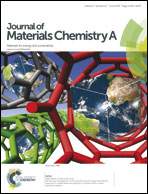Exploration and optimisation of poly(2,2′-bithiophene) as a stable photo-electrocatalyst for hydrogen production†
Abstract
An organic photo-electrochemical catalyst for the hydrogen evolution reaction (HER) based on the conducting polymer, poly(2,2′-bithiophene) (PBTh), is further explored. Long-term stability testing shows the successful operation of the catalyst over a period of 12 days at neutral pH with corresponding turnover numbers exceeding 6 × 104. Experimental parameters such as substrate type, electrolyte, pH and thickness of the film are explored and their subsequent effects on catalytic behaviour and performance discussed. Significant findings include the four-fold increase in performance by the reduction of thickness to better facilitate charge transfer and the successful photo-catalysis of the HER at pH 11, with an onset that is 0.14 V below E0. Faradaic efficiency was also determined with a maximum recorded efficiency of 80% despite known losses such as crossover reactions and H2 escape from within the system.


 Please wait while we load your content...
Please wait while we load your content...